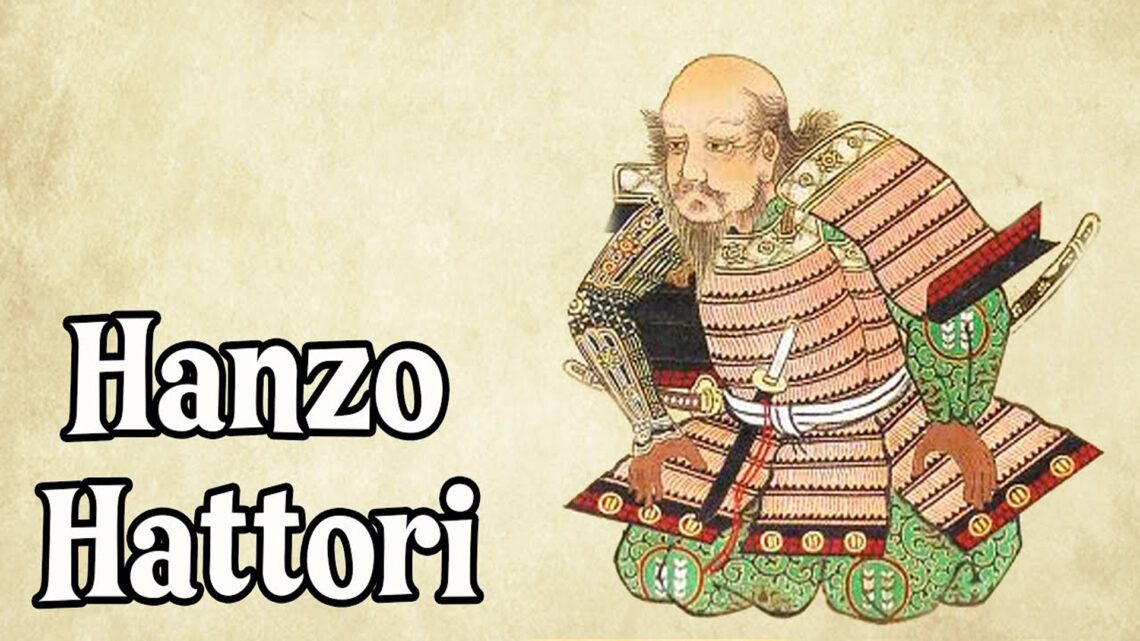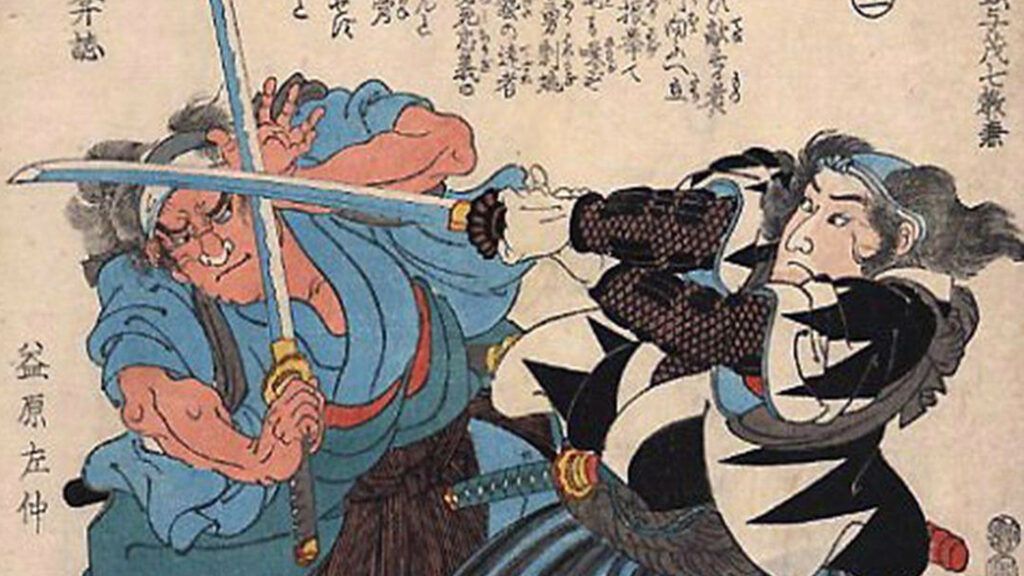
Miyamoto Musashi, an icon of Japanese swordsmanship and philosophy, remains a fascinating figure centuries after his death. His life and work are surrounded by legends and myths, and his teachings continue to have a significant influence on martial artists, philosophers, and leaders worldwide. In this blog post, we will delve deeply into the life, achievements, and legacy of Miyamoto Musashi.
Born in 1584 in the province of Mimasaka, Japan, Miyamoto Musashi was born under the name Shinmen Musashi no Kami Fujiwara no Harunobu. His father, Shinmen Munisai, was a respected samurai and an expert in Kenjutsu, the art of sword fighting. Despite this prestigious lineage, Musashi spent much of his childhood separated from his father and was raised by a maternal uncle who instructed him in the basics of swordsmanship.
From a young age, Musashi showed extraordinary talent and deep passion for sword fighting. He spent hours perfecting his skills by battling against wooden dummies and developing techniques that would later lead to his revolutionary combat methods. However, Musashi’s education was not limited to combat; he also showed interest in literature, painting, and the aesthetics of traditional Japanese culture.
At the age of 13, Musashi began his training under the swordmaster Arima Kihei, who taught him the fundamentals of sword fighting and introduced him to the teachings of Zen Buddhism. This early encounter with Zen Buddhism would have a profound influence on Musashi’s thinking and his later philosophy. During his training, Musashi also traveled throughout Japan, challenging renowned swordsmen to duels to test and improve his skills.
With age and experience, Musashi became a feared warrior, whose reputation spread throughout the land. His unconventional combat techniques, often aimed at overwhelming opponents through deception and cunning, made him a legend among his contemporaries. Yet, despite his fame and victories, Musashi remained true to the path of self-improvement, continuing his quest for enlightenment and perfection in swordsmanship.
In 1600, Musashi participated in the famous Battle of Sekigahara, a decisive conflict that shaped Japan’s fate for decades to come. Although the exact circumstances of his involvement are disputed, it is generally believed that Musashi demonstrated his skills during the battle and contributed to a crucial victory for his lord’s side.
After the Battle of Sekigahara, Musashi withdrew from active military service and instead devoted himself to perfecting his martial art and spiritual development. He spent years meditating and training in solitude, deepening his understanding of sword fighting and refining his philosophical beliefs. During this time, he also composed his famous work “Gorin no Sho” or “The Book of Five Rings,” a treatise on combat strategy, philosophy, and way of life that continues to be regarded as one of the most important works of samurai literature.
However, Musashi’s life was not solely defined by combat and meditation. He was also a talented artist and calligrapher, whose works were praised for their beauty and elegance. Additionally, he was an avid student of traditional Japanese tea ceremony and a skilled gardener who passionately embraced the beauty of nature and the harmony of life.
Despite his outstanding skills and deep spiritual commitment, Musashi remained a humble and modest man who never exploited his fame and success for selfish purposes. He lived a simple life, far from the political intrigues and power struggles of his time, instead seeking enlightenment and truth in the simple pleasures of existence.
In 1645, Musashi retreated into solitude, spending his final years in a secluded mountain village, where he continued to meditate, write, and teach. On May 19, 1645, Miyamoto Musashi passed away at the age of 61, yet his legacy continues to endure.
Miyamoto Musashi left the world not only a rich legacy of martial arts and philosophy but also an example of the importance of self-control, discipline, and inner peace. His life and teachings remind us that true strength lies not in external success or fame, but in the ability to master our own minds and live in harmony with the universe. May his legacy continue to inspire and teach us to progress on our own paths of self-improvement and enlightenment.
The Fighting Techniques of Miyamoto Musashi
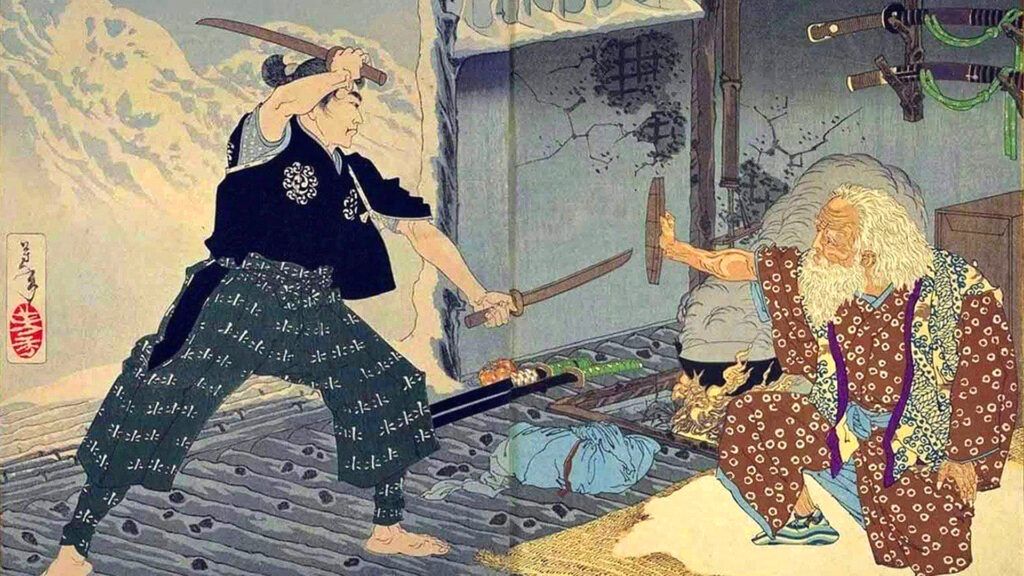
Miyamoto Musashi, the legendary Japanese swordsman, is famous for his unconventional and effective fighting techniques. In this blog post, we will delve deeply into the unique techniques of Miyamoto Musashi that have made him one of the greatest warriors in history.
The Nito-ryu Technique:
One of Miyamoto Musashi’s most well-known techniques is the Nito-ryu, also known as the “Two-Sword Style.” Musashi was renowned for using both a long katana and a short wakizashi to gain superiority over his opponents. By simultaneously wielding two swords, he could employ various attack and defense strategies, often leaving his opponents confused.
Utilization of Iaijutsu:
Musashi was also a master of Iaijutsu, the art of quick drawing and striking with the sword. His ability to swiftly draw his sword from its sheath and deliver a deadly blow made him a feared adversary in close combat. Musashi perfected this technique through years of intense training, developing his own unique method based on speed and precision.
Application of Strategy and Deception:
Musashi was not only a master of physical combat but also a brilliant tactician. He often utilized cunning and deception to surprise and defeat his opponents. By making seemingly unconventional or unpredictable movements, Musashi could throw his adversaries off balance and exploit their weaknesses. This strategic finesse made him a formidable opponent, often considered invincible.
The Art of Disarmament:
Another notable technique of Musashi was his ability to disarm his opponents without injuring them. Instead of simply aiming for the destruction of his opponent, Musashi often sought ways to peacefully resolve conflicts by disarming his adversaries and giving them the opportunity to surrender. This humane approach to combat reflects Musashi’s deep spiritual conviction and his understanding of the values of Bushido, the Way of the Warrior.
Development of the Mind in Combat:
For Musashi, combat was not just a matter of physical abilities but also of the mind. He taught that true strength comes from inner calmness, concentration, and mental clarity. Musashi emphasized the importance of meditation and mental discipline as the foundation for successful martial arts. By aligning body, mind, and soul, Musashi could unleash his full combat prowess and overcome his opponents.
Miyamoto Musashi was undoubtedly one of the greatest warriors to have ever lived, and his techniques and teachings continue to have a profound impact on martial arts and philosophy to this day. Through his unique methods of swordsmanship and tactical brilliance, Musashi remains an inspiring figure for martial artists and seekers around the world. His legacy will endure as long as there are people striving for truth, wisdom, and perfection.
the rule of Miyamoto Musashi
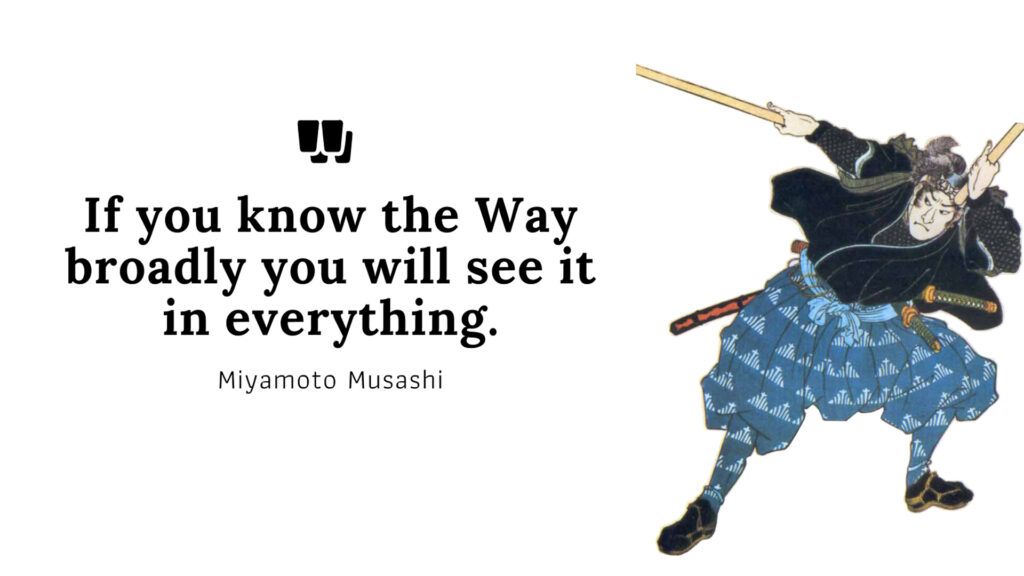
Miyamoto Musashi, one of the most significant figures in Japanese history, has exerted a profound influence on the development of the country. In this blog post, we will extensively explore Miyamoto Musashi’s influence on the history of Japan and examine his significance for various aspects of Japanese culture, society, and philosophy.
Impact on Swordsmanship:
Musashi’s greatest contribution to Japan’s history undoubtedly lies in the realm of swordsmanship. As a master of Kenjutsu and the founder of the Niten-Ichi-Ryu school, he significantly shaped the development of swordsmanship in Japan. His revolutionary combat techniques and philosophical teachings influenced generations of swordsmen and contributed to the development of modern Kendo. Musashi was not only an outstanding warrior but also a brilliant teacher who imparted his knowledge and experience to numerous students, who followed his teachings and spread his techniques.
Role in the Sengoku and Edo Periods:
Musashi lived in a time of great political unrest and military conflicts in Japan. During the Sengoku period, also known as the “Age of Warring States,” the country was marked by civil wars and power struggles between various samurai clans. Musashi actively participated in these conflicts and played a significant role in battles such as the Battle of Sekigahara. His skills as a warrior and tactician helped influence the outcome of numerous battles and shift the balance of power between the various factions. In the subsequent Edo period, a period of peace and stability under the rule of the Tokugawa Shogunate, Musashi’s legacy continued to thrive as his teachings in swordsmanship and philosophy were still valued and practiced.
Influence on Philosophy and Bushido:
Musashi was not only a master of swordsmanship but also a profound thinker and philosopher. His writings, including the famous “Book of Five Rings,” are masterpieces of samurai literature offering insights into combat strategy, philosophy, and way of life. Musashi’s philosophy emphasized the importance of simplicity, honesty, and mental strength in the life of a samurai, thus shaping the concept of Bushido, the “Way of the Warrior.” His teachings influenced the moral ideals and behaviors of the samurai class and contributed to the development of a unique samurai ethic that still resonates in Japanese society today.
Influence on Popular Culture:
Musashi’s life and legend have also exerted a significant influence on Japanese popular culture. Numerous books, films, comics, and video games have been created about his life and adventures, and his name has become synonymous with bravery, honor, and martial arts. Musashi’s stories have fascinated and inspired generations of people around the world and are an integral part of Japanese cultural identity.
Veneration as a Historical Figure:
Today, Miyamoto Musashi is revered as one of the greatest historical figures in Japanese history. His grave in the city of Kumamoto is a pilgrimage site for swordsmen, philosophers, and admirers from around the world who honor his wisdom and courage. Musashi’s legacy lives on in the hearts and minds of people inspired by his example and striving to follow his teachings.
Overall, Miyamoto Musashi was a fascinating personality whose influence on the history of Japan extends far beyond his time. His mastery in swordsmanship, philosophical insights, and moral integrity make him an icon of Japanese culture and a timeless role model for all who seek truth, wisdom, and inner strength. May his legacy continue to shine and touch the hearts of people around the world.
The Legacy of Miyamoto Musashi
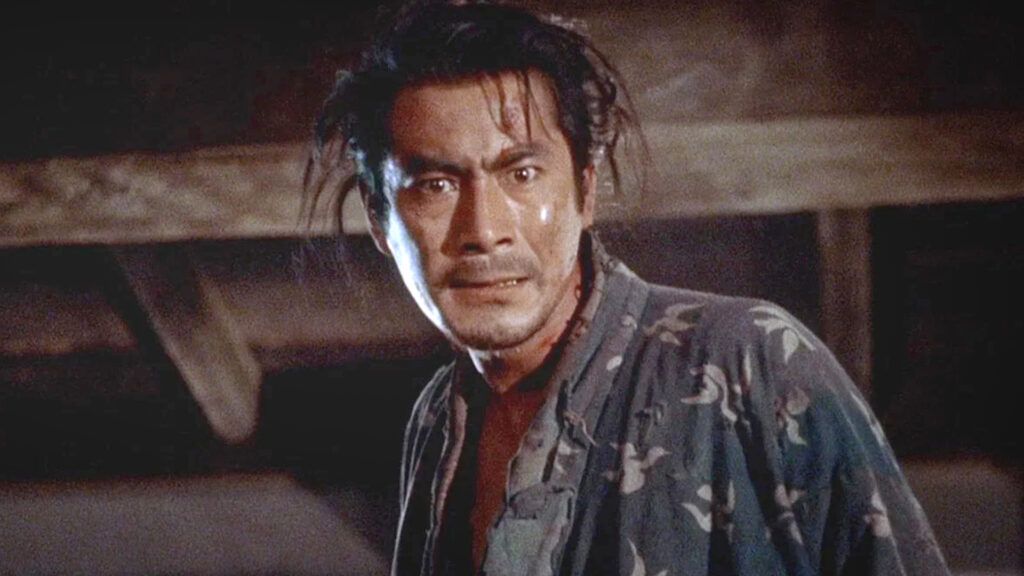
Miyamoto Musashi left behind a rich legacy that extends far beyond his time and continues to inspire people around the world to this day. In this blog post, we will extensively delve into the legacy of Miyamoto Musashi and examine its significance for various areas such as martial arts, philosophy, culture, and way of life.
Musashi’s legacy in the field of martial arts is invaluable. As the founder of the Niten-Ichi-Ryu school of swordsmanship, he created a tradition that endures to this day. His unique techniques and philosophical teachings have influenced and inspired numerous martial artists worldwide. The principles of Musashi-Do, based on simplicity, flexibility, and presence of mind, remain an integral part of many martial arts styles today and are equally appreciated by students and masters alike.
Musashi’s philosophical legacy is as significant as his contribution to martial arts. His writings, especially the “Book of Five Rings,” are masterpieces of samurai literature offering insights into the art of war, human nature, and the pursuit of personal perfection. Musashi’s philosophy emphasized the importance of discipline, self-control, and mental strength, leaving a profound impact on those seeking wisdom and enlightenment.
Musashi’s legacy is also deeply rooted in Japanese culture, manifesting in various forms such as literature, art, theater, and film. Numerous novels, poems, and dramas have been written about his life and adventures, and his story has been immortalized in numerous films and television series. Musashi has become a cultural icon representing bravery, honor, and martial arts, enriching the awareness and imagination of people worldwide.
Musashi’s teachings on martial arts and philosophy have also deeply influenced the way of life for many people. His emphasis on simplicity, honesty, and mental strength has inspired people around the world to strive for a meaningful and fulfilling life. Musashi’s example as a master of the sword and the mind encourages us to develop our own abilities, overcome obstacles, and strive for personal perfection.
The legacy of Miyamoto Musashi will continue to live on and inspire generations of people around the world. His timeless teachings on martial arts, philosophy, and way of life will remain a source of wisdom and inspiration. By honoring and passing on Musashi’s legacy, we contribute to keeping his message of strength, honor, and wisdom alive and making the world a better place.
Overall, the legacy of Miyamoto Musashi is a treasure of immeasurable value, reminding us that true greatness lies not in external fame or material wealth, but in the ability to unfold our inner powers and lead a life of bravery, honor, and wisdom. May his legacy continue to shine and inspire the hearts of people worldwide.

